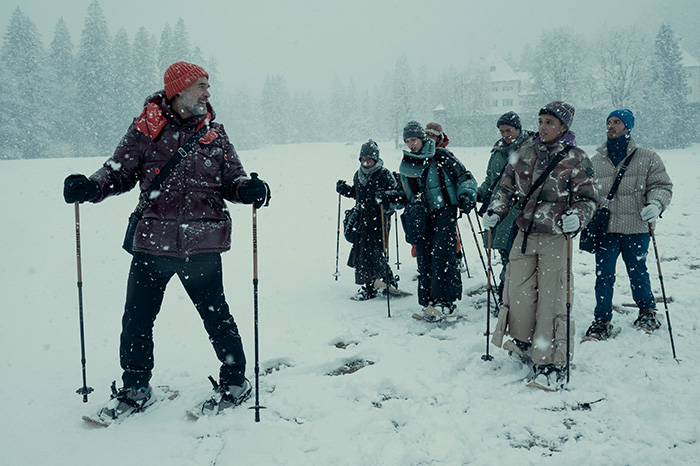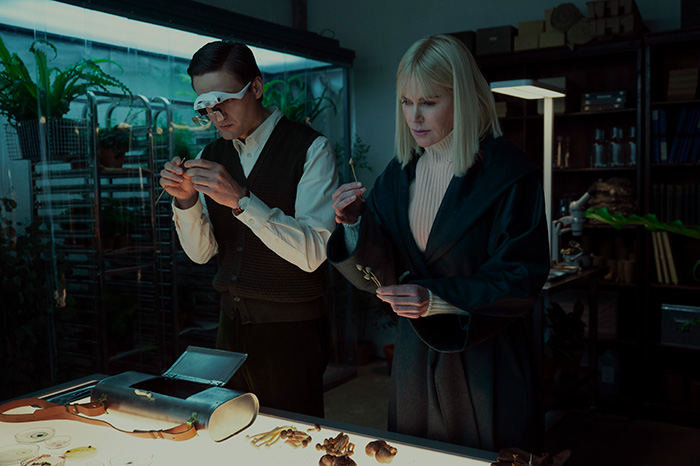REVIEW: ‘Nine Perfect Strangers’ Season 2 falls into sophomore slump
Warning: This review contains spoilers.
Nine Perfect Strangers wraps up its first season, which premiered four years ago, with the affluent guests of Tranquillum House all attaining their desired endings, including Russian wellness guru Masha Dmitrichenko, played by Nicole Kidman, who speeds off to freedom, with the specter of her late daughter, Tatiana, accompanying her.
Harnessing the original’s open-ended finale, the Hulu thriller drama returns for a second installment, this time in the biting winds of the Swiss Alps, even as the Liane Moriarty bestseller it was culled from has ended. “It won’t be easy and it might be painful, but you will grow from this,” Masha promises us. The first half of the statement is certainly the case, as the new season is often frustrating, rarely gets our adrenaline going, and simply a dull screed against impossible people.
Following the New Yorker cover piece about her psychedelic therapy written by first season’s Lars Lee (Luke Evans), Masha is now a global sensation who’s also on the run from several federal investigations, with Kidman sporting a never-better, ice-blond wig. She teams up with Silicon Valley tech experts to develop a “psychedelic delivery system” that she claims will induce a “neuroplastic state” in patients, allowing them to relive “formative memories.” The catch, of course, is that she has yet to put her novel, drug-laced therapy to test, save for some lab rats and herself. So enters her former mentor, Helena (Lena Olin), who offers to host her practice at a sweeping, off-limits Zauberwald resort, with supervision from pharmacologist Martin (Lucas Englander).
Parallel to the stupidly rich clientele of the HBO hit series The White Lotus, Nine Perfect Strangers boasts its own set of dysfunctional guests on its own version of paradise/prison. At-once hot and awkward Peter (Henry Golding) signs up for the health retreat in hopes of mending his relationship with his distant billionaire father, David (Mark Strong), just as Imogen (Annie Murphy) seeks to reconcile with her dazzling yet emotionally hollow mother, Victoria (Christine Baranski), who then finds comfort in her charming young lover, Matteo (Aras Aydin). Tense and hot-tempered Brian (Murray Bartlett) is a disgraced television host; ex-nun Agnes (Dolly de Leon) outruns a tragic past that results in a crisis of faith; while lesbian musician couple Tina (King Princess) and Wolfie (Maisie Richardson-Sellers) wrestle with their fractured relationship, heightened by the former’s growing disinterest in her craft.

The series retains not only its cabin-fever premise but also the tricks from its debut season. Masha still can’t stick to her own protocols, still holds her one-on-one sessions, maintains surveillance over her guests, and microdoses her way into their wounds and that of hers (only now it no longer comes as a surprise to her clients as well as the show’s audience).
What it finds hard to replicate, though, is the humor, interest, or at least the level of fun that season 1 offered, even as that season feels narratively rocky and crowded. Masha’s fixation on projecting her pain onto her guests presents a compelling corner for exploration, but it will only be effective if the show extends as much attention to the backstories of the titular strangers as the writers have given to Masha’s.
Showrunners David E. Kelley and John-Henry Butterworth, alongside the screenwriters they have at their disposal, seem to undermine the fact that Masha has “carefully selected” each guest to undergo her groundbreaking therapy, which is ironic considering that the writing is unable to meaningfully examine why this set of people is worthy of our attention; cursory details and occasional hallucinatory flashbacks won’t cut it. At the same time, the class analysis the show peddles through Strong’s billionaire character (who registers as someone who just needs a good f**k) does not really hold up, as David eventually just plays the designated romantic interest and foil to Masha.
Given how disproportionate the individual arcs pan out compared to that of the show’s partly deranged and controlling heroine, this latest edition provides us with characters that chiefly function instead of live, and feel like bloated sketches rather than complex human beings—a lazy rendering that even Frank Lamm’s knack for breathtaking and often trippy cinematography, steeping us in an unmistakable Bavarian atmosphere and the fancy interiors of the luxury retreat, cannot make up for.
If the viewers of the first season did take pleasure in watching a group of people racked with incredible pain and trauma get stoned, which has been the series’ bread and butter, that unfortunately no longer works here because there’s simply nothing more to the experience than this heightened delirium and compulsion to take things to the extremes, only to smooth it out so easily later on. Here, it is not the drug that disorients us but the lackluster writing. And it doesn’t necessarily mean that we have to root for these characters, but the show, at the minimum, must make us care about them—why else would we want to witness these miserable people get high over and over again?

The new season’s defining pleasure, though, lies in the performances of Bartlett and de Leon. Bartlett, often seen conversing with a vision of a stuffed bear he used to have on his show, stands out as a once-popular television puppeteer overcome with regret, anger, and anxiety, reflecting the pitfalls of cancel culture and the crippling consequences of living a very public life; and despite that, there’s still warmth and gentleness in the character that allows him to forge a friendship with de Leon’s Agnes, one of the rare connections that flows so fluidly in the series and gives it the respite and emotional resonance it needs, particularly in a scene in the sixth episode where the two of them, alongside the artist couple, reflect on their time at the luxury retreat while nestling in a pool of red wine.
De Leon, too, has the most interesting arc throughout the season. Her portrayal of Agnes is equal parts enigmatic, funny, and deeply evocative, dealing with punishing guilt and seeking absolution for a botched childbirth procedure in her past, only to realize that it isn’t the divine voice that needs to forgive her but herself. It is through de Leon’s subdued yet knows-when-to-explode performance that the series finds some quiet intensity.
Still, contrary to the transformative powers that Masha’s psilocybin peddles, this sophomore season of Nine Perfect Strangers is far from a life-altering experience. If anything, it doesn’t pack a strong critical punch, and mostly functions as a rehash of the first season, only with a different batch of actors that, seasoned as their talents are, are kneecapped by the material’s shortsighted vision. This latest iteration could have been a profound, high-octane portrait of grief and healing, but the risks it takes simply don’t cohere into that desired outcome. It just feels like a saturated field. A classic case of déjà vu. What novel, meaningful insights could it have offered other than what we already gained from its predecessor?
Nine Perfect Strangers streams on Prime Video.


